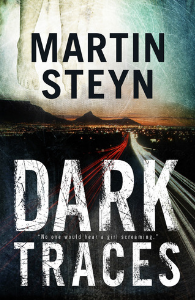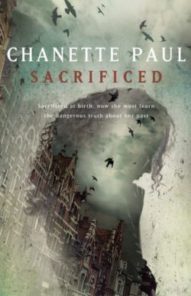Cornelius Delport. Born in 1985. Unmarried. Not only a teacher at Maryke Retief’s school for the past three years, but one of her teachers as well. And owner of a white Honda Civic with a Stormers sticker on the back.
It didn’t even qualify as circumstantial evidence, Magson reflected, turning his eyes up to the ceiling of his office. Del-port had no criminal record, either.
He was one of the teachers they had spoken to, but Mag-son couldn’t recall much about him. Which meant he hadn’t made much of an impression. Always useful if that person aspired to being a successful murderer.
It wasn’t much, but it was something. And no clue was too weak to follow up on.
He took his jacket and left the office.
A large part of police work consisted of phone calls, but Magson had always felt that face-to-face conversations were rather more productive. People were more likely to divulge information, particularly of the sensitive kind. And it was easier to see if they were hiding something or lying. Thus, whenever possible and when the potential information could prove to be important, he always tried to go to the person. Cornelius Delport had previously taught at a different school, and Magson was curious about his reasons for leaving. Maybe it had been nothing, but maybe it had been something. And if it had been something, his former principal might just be more inclined to talk about it with Magson sitting right there in his office.
“Thank you for your trouble.” The principal had already been home when Magson phoned and had come back to school.
“As I said, I live nearby. And it is truly awful about that girl. But, Warrant, I still don’t understand how I could be of help.” He had his elbows on the armrests of his chair, his fingers forming a tent in front of him.
“Well, obviously we have to take a look at everyone who had contact with Maryke Retief, including her teachers. One of them taught here in the past.”
“Oh? Who’s that?”
“I just want to state that we’re not talking about suspects here. It’s just routine.”
The principal nodded, but his bushy eyebrows rose. “And yet you drove all the way here, Warrant.”
“I had to come in this direction anyway. But it is a sensitive case.”
“What is the individual’s name?”
“Cornelius Delport.”
“Neels? Oh.” It was obvious the name didn’t leave a pleasant taste in the principal’s mouth. He lowered his hands and shifted in his chair.
“Why did he leave?”
The principal rubbed the tip of his nose and straightened a book on his desk. “People do sometimes change employers, Warrant.”
“That is true,” said Magson. “But usually they have a reason.”
“It was years ago …” He wiped along the edge of the desk, as if he’d noticed some dust.
“Is there someone else who might remember?”
The principal looked up quickly. “There was never—they were only ever allegations …”
“What ‘allegations’?”
The man’s shoulders sagged. He stared at the book on his desk. “There was a rumor that Neels Delport had had a … relationship with one of the girls in Grade 11.” He looked up at Magson. “But there was never any concrete evidence, and the girl denied it. Still, the rumors persisted. The learners circulated it as fact. Some of the parents got wind of it and eventually the situation became unsavory. The governing body decided it would be best if Neels … resigned.”
“And Delport just accepted it?”
“Well, he denied the allegations, but the situation was unpleasant for him as well. He offered to leave if we … supported his applications at other schools.”
“Do you think he was involved with the girl?”
“As I said, there was never any concrete evidence. But I had the feeling there was …” He paused. “… something going on. I’m not sure how serious it was. Children have a tendency to embellish a story and that was where most of the details had come from. Neither Neels nor the girl admitted to anything.” He looked at Magson. “But, Warrant, surely you don’t think that he …”
“What happened to the girl?”
“She transferred to a different school. The learners made it impossible for her to stay.”
Magson nodded. “Was she a loose girl?”
“That wasn’t the impression she gave. She wasn’t the type of learner teachers really talk about among themselves. There were no complaints about her, but she didn’t excel.”
The principal might just as well have described Maryke Retief. “Was Delport involved in any other incidents?”
“None before the rumors started circulating. After that there was … an episode involving Neels and one of the other teachers.”
“What kind of ‘episode’?”
“Well, they had words, a confrontation, I suppose. When it got physical, other teachers intervened.”
“Other than these incidents, what was your opinion of Neels Delport during the time he was here?”
The principal was silent for a moment. After a while he sat back and rebuilt his finger tent. “Warrant, I have been in education for a long time. There are always some children who are troublemakers. Usually, it derives from a lack of attention and love at home. Children fight it for all they’re worth, but they like discipline. It means they are being protected because they’re precious. Of course they would never admit it—and I doubt whether many even realize it on a conscious level—but that’s what these troublemakers are really seeking with their behavior. But then, Warrant, there is another type of child. He isn’t conspicuous, he doesn’t really cause any problems. You barely remember him after he’s gone. And then, one day, you read about him in the papers. Perhaps he swindled some elderly people out of their pensions. Perhaps he murdered his wife. Neels Delport reminds me of that kind of child. Prior to the story with the girl, he was here without being noticeable.” He stroked his chin. “Of course, some of these … ‘invisible’ children simply become ‘invisible’ adults.”





